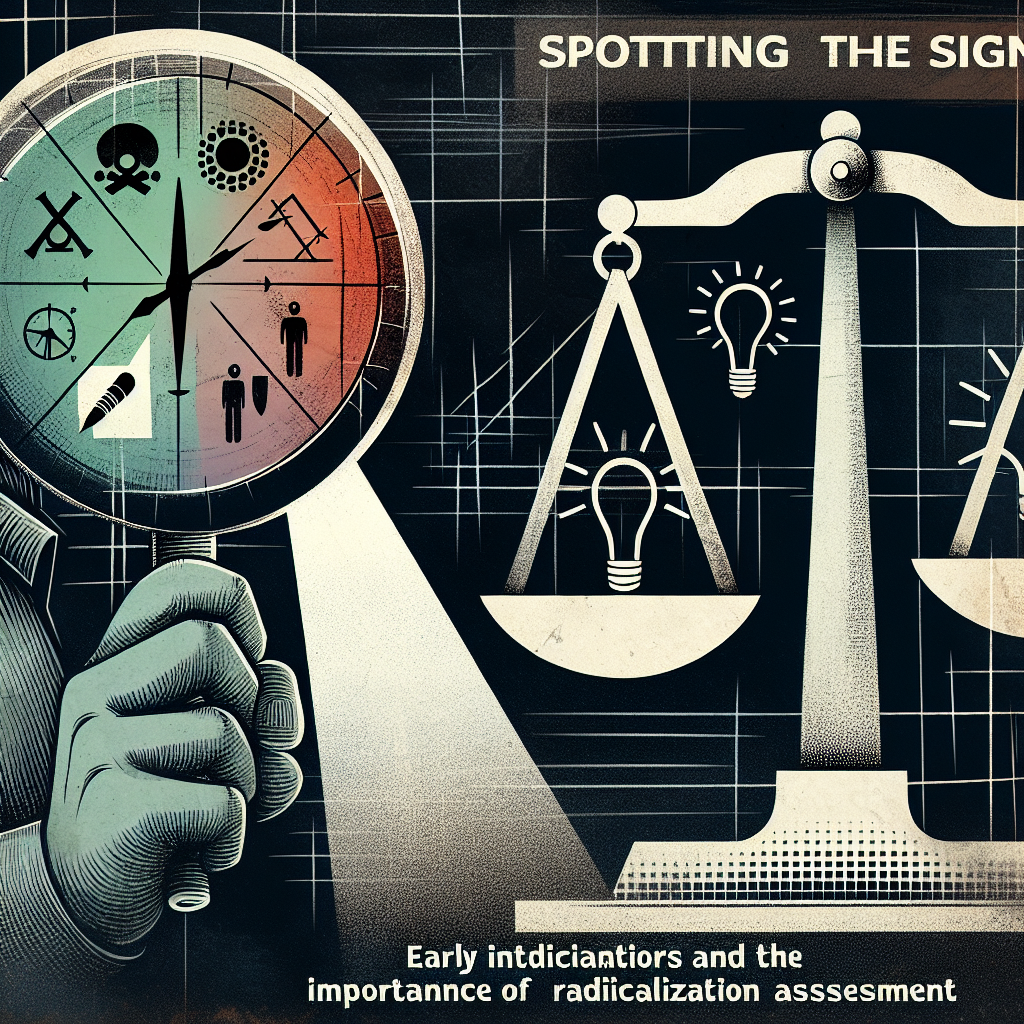Introduction
In an increasingly polarized world, the importance of understanding the early signs of radicalization cannot be overstated. Communities are often left grappling with the aftermath of extremist violence, yet many attacks could potentially be prevented by effectively spotting the signs early. This article delves into Spotting the Signs: Early Indicators and the Importance of Radicalization Assessment. We’ll explore critical indicators of radicalization, the psychological and social factors at play, and the methods for assessing individuals at risk. By arming ourselves with this knowledge, we can create a safer, more cohesive society.
Understanding Radicalization
What is Radicalization?
Radicalization refers to the process by which individuals come to adopt extremist views, ideologies, or behaviors. This journey often starts with subtle beliefs, but can escalate into violent actions. Understanding the nuances of radicalization involves looking at a complex interplay of personal, social, and psychological factors.
Why is Radicalization Assessment Important?
Spotting the signs of radicalization is crucial for various reasons:
- Prevention of Violence: Identifying at-risk individuals can lead to interventions that may prevent acts of violence.
- Community Safety: Enhanced awareness can foster safer communities.
- Policy Development: Insight into radicalization trends aids policymakers in crafting effective strategies.
Early Indicators of Radicalization
The crux of Spotting the Signs: Early Indicators and the Importance of Radicalization Assessment lies in identifying early warning signs. Though these indicators can vary widely, some common signs have emerged from various studies and case analyses:
1. Behavioral Changes
One of the first indicators often noticed by friends or family is a marked change in behavior. This may include:
- Withdrawal from social circles.
- Sudden changes in interests or hobbies.
- Increased secrecy or emotional distance.
2. Ideological Shifts
An individual may begin expressing extreme views that alter their previous beliefs. For instance:
- Glorification of violence or terrorism.
- Intolerance towards certain groups or ideologies.
3. Online Activity
In today’s digital age, online footprints can provide significant insights. Indicators include:
- Frequent visits to extremist websites.
- Participation in forums promoting radical ideologies.
- Sharing or posting extremist-propaganda.
4. Targeted Relationships
Individuals may start to isolate themselves from their established social networks while forming ties with individuals or groups that espouse radical ideologies.
5. Impact of Extremist Groups
Engagement with organized extremist groups often contributes to accelerated radicalization. Signs can include:
- Attending rallies or events.
- Active recruitment efforts.
Case Studies: Real-World Applications
Case Study 1: The Boston Marathon Bombing
In the aftermath of this tragic event, research identified several early warning signs. Tamerlan Tsarnaev exhibited radicalized behavior through online searches and associations with extremist forums long before the attack. Here, the lack of timely intervention underscores the importance of spotting the signs early.
Analysis: This case highlights that a comprehensive radicalization assessment framework could have potentially prevented the tragedy by identifying Tsarnaev’s escalating concerns.
Case Study 2: The Christchurch Mosque Shootings
Brenton Tarrant’s social media history showed a clear trajectory of radicalization. His online presence included a growing preoccupation with far-right ideology, encapsulating the need for platforms to monitor and report on dangerous trends.
Analysis: This indicates that collaboration between social media companies and law enforcement is crucial for early identification of radicalized individuals.
Methodologies for Radicalization Assessment
Psychological Assessments
Psychological evaluations can help professionals gauge an individual’s risk of becoming radicalized. Instruments such as:
- The Extremist Behavior Scale: Assessing attitudes towards violence.
- The Radicalization Assessment Checklist: Focused on behavior and ideology.
Community Engagement
Active community programs can serve as a frontline measure to assess risk. Involvement can provide:
- Safe spaces to voice concerns.
- Education and awareness initiatives.
Law Enforcement Collaboration
Police departments increasingly engage in partnerships with community stakeholders to spot the signs of radicalization. This collaborative effort can help create a swift response to concerning behaviors.
Tools and Techniques for Spotting the Signs
Observation and Training
Training community members to recognize signs can vastly improve the early assessment of radicalization. Workshops can empower:
- Teachers.
- Social workers.
- Parents.
Data Analytics
Using big data to analyze online behavior patterns can provide organizations with groundbreaking insights. Advanced algorithms can analyze language use, online engagement, and sentiment changes to predict radicalization trends.
Challenges in Radicalization Assessment
Stigmatization
There is a risk of stigmatization when communities monitor behaviors that could indicate radicalization. Balancing vigilance with compassion is vital to avoid alienating individuals who may just need support.
Legal and Ethical Considerations
Law enforcement must navigate privacy concerns and civil liberties when assessing individuals for potential radicalization.
Conclusion
In closing, Spotting the Signs: Early Indicators and the Importance of Radicalization Assessment is not merely an academic exercise but a moral imperative. We have the tools and knowledge to recognize the early signs of radicalization, but it requires collective effort. By remaining vigilant, fostering community engagement, and employing assessment strategies, we can create a healthier, safer society.
Let us inspire action in our communities and work together to challenge extremist ideologies before they take root.
FAQs
1. What is radicalization?
Radicalization is the process through which individuals come to adopt extremist beliefs, potentially leading to violence.
2. Why should I be concerned about early indicators of radicalization?
Spotting early indicators can allow for interventions that may prevent violent acts and foster a safer community.
3. How can I identify signs of radicalization in someone I know?
Look for behavioral changes, ideological shifts, and unusual online activity. Additionally, take note of their social relationships.
4. What role can communities play in radicalization assessment?
Communities can monitor behavioral changes, provide educational resources, and foster open dialogues to recognize potential warning signs.
5. What resources are available for professionals involved in radicalization assessment?
Various psychological assessment tools and community engagement programs are designed to assist professionals in recognizing and addressing radicalized individuals.
By staying informed and engaged, we can make strides in the Spotting the Signs: Early Indicators and the Importance of Radicalization Assessment, ensuring that our communities remain safe and united.

